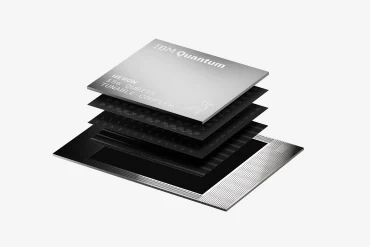
- Algorithmic Trading
- Bond Trading
- Quantum & Chips
- Quantum Computing
IBM Quantum Computing Boosts HSBC Bond Trading Accuracy
5 minute read

Quantum computing technology boosts HSBC bond trading accuracy by 34% in groundbreaking IBM partnership implementation
Key Takeaways
- IBM stock rises 3.3% following HSBC’s completion of the world’s first quantum-enabled algorithmic trading trial using IBM’s quantum computing technology
- 34% improvement in trading predictions achieved by HSBC’s quantum-enhanced bond trading system compared to traditional computing methods in European corporate bond markets
- $7.5 billion AI revenue growth reported by IBM in Q2 2025, up from $2 billion in 2024, demonstrating strong performance across advanced technology segments
Introduction
IBM shares surge as quantum computing moves from laboratory theory to real-world financial application. HSBC’s successful quantum-enabled bond trading trial represents a breakthrough moment for both companies, demonstrating that quantum technology can deliver measurable business advantages in live trading environments.
The collaboration produced significant performance improvements in predicting trade execution probability. This marks the first time quantum computing has been successfully applied to algorithmic trading at production scale, using genuine market data processed through IBM’s advanced Heron quantum processor.

Key Developments
HSBC validated its quantum trading models using anonymized trading records from European corporate bond markets. The experiment focused on optimizing requests for quotes in over-the-counter markets, where assets trade directly between parties without centralized exchanges.
IBM’s Heron quantum processor enhanced classical computing workflows by analyzing pricing signals in market data. The hybrid approach combined quantum and classical resources to process real-time market conditions and risk estimates, enabling more accurate pricing of customer inquiries.
The trial addressed specific challenges in bond trading, including rapid price adaptation to changing market conditions. According to HSBC, quantum methods excelled at deciphering hidden pricing signals within noisy market data, surpassing existing classical-only approaches.
Market Impact
IBM stock gains 3.3% in Thursday morning trading, reflecting investor confidence in the company’s quantum roadmap. The positive market reaction signals growing belief that quantum computing applications are approaching commercial viability sooner than anticipated.
The quantum computing sector shows strong momentum, with average price targets reaching $69.98 for 2025. IBM’s diversified revenue streams provide stability while funding quantum development, unlike smaller pure-play competitors facing higher financial risks.
Financial services emerge as primary early adopters of quantum technology. The industry’s requirements for advanced modeling, risk analysis, and secure transactions align well with quantum computing capabilities, potentially accelerating sector-wide adoption.

Strategic Insights
IBM’s quantum strategy leverages established business segments to fund long-term research and development. The company’s approach using superconducting qubits aligns with existing semiconductor manufacturing infrastructure, supporting future scalability and mass-market potential.
The successful trial validates IBM’s focus on practical applications rather than theoretical capabilities. This positions the company advantageously against competitors as quantum computing transitions from research to commercial deployment.
HSBC’s breakthrough demonstrates quantum computing’s ability to solve complex business problems at scale. Banks and investment firms could achieve more accurate asset pricing, faster transaction processing, and enhanced risk management through quantum-enhanced systems.
Expert Opinions and Data
Philip Intallura, HSBC Group Head of Quantum Technologies, describes the trial as “a ground-breaking world-first in bond trading.” He emphasizes that quantum computers can “solve a real-world business problem at scale and offer a competitive edge.”
IBM’s financial performance supports continued quantum investment, with second-quarter 2025 revenue rising 8% year-over-year to $17 billion. Free cash flow projections exceed $13.5 billion in 2025, up from $12.7 billion in 2024, indicating robust financial health.
The company’s generative AI business demonstrates strong growth across advanced technologies, expanding from $2 billion to $7.5 billion annually. This diversified approach provides multiple revenue streams while quantum computing matures commercially.
Intallura expresses confidence in near-term quantum applications: “We have great confidence that we are on the cusp of a new frontier of computing in financial services, rather than something that is far away in the future.”

Conclusion
HSBC’s quantum-enabled trading trial validates IBM’s quantum computing strategy and accelerates the technology’s path to commercial adoption. The demonstration proves quantum computers can deliver measurable business value in demanding financial environments.
IBM’s stock performance reflects market recognition of the company’s quantum leadership position. The combination of immediate trading improvements and long-term technology potential positions both IBM and quantum computing for accelerated growth in financial services and beyond.






